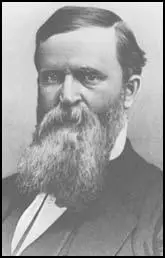James Weaver

James Baird Weaver, the son of a farmer, was born in Dayton, Ohio, on 12th June, 1833. After graduating from Cincinnati Law School and established himself as a lawyer in Bloomfield, Iowa. He became involved in the anti-slavery movement after reading Uncle Tom's Cabin by Harriet Beecher Stowe.
On the outbreak of the American Civil War Weaver enlisted as a private in the Union Army. In 1861 he received a lieutenant's commission and fought at Shiloh. He also served in his home state where he helped suppress pro-slavery violence and by the end of the war had reached the rank of brigadier general.
A member of the Republican Party, Weaver was elected district attorney of the Second Iowa Judicial District in 1866. The following year he became federal assessor of internal revenue.
Weaver witnessed the hardship caused by declining farm prices, high railroad rates and the government's deflationary currency policies. He became disillusioned with the government of Ulysses Grant and considered the Republican Party to be under the control of big business.
In 1878 Weaver joined the Greenback-Labor Party. He successfully won a seat in Congress on a policy of an expanded and flexible national currency. Weaver soon emerged as a national political figure and in 1880 ran for the presidency. During the campaign Weaver argued that the two major political parties had lost sight of their original democratic ideals of equal opportunity. He also claimed that the maintenance of the gold standard benefited banking interests but was driving farmers out of business. Weaver called for policies where all classes could share in the economic wealth of America.
The Greenback Labor Party program included the coinage of silver on a par with gold, an adequate supply of money, the taxing of government bonds, a maximum eight-hour day, the introduction of graduated income tax and opposition to railroad land grants.
Weaver obtained 308,578 votes but was easily beaten by James Garfield (4,454,416) and Winfield S. Hancock (4,444,952). Most of Weaver's support came from the rural West but he was now one of the most important political figures in the United States. The following year he was elected to Congress and became chairman of the Committee on Expenditures in the Department of the Interior.
The Greenback-Labor Party merged with the Democratic Party in most states. Weaver was against this policy and in 1891 helped establish the Populist Party. The party advocated the public ownership of the railroads, steamship lines and telephone and telegraph systems. It also supported the free and unlimited coinage of silver, the abolition of national banks, a system of graduated income tax and the direct election of United States Senators.
In 1892 Weaver became the party's presidential candidate and his decision to form an alliance with black groups in the South led to outbreaks of violence and voter intimidation. Weaver obtained 1,041,028 votes and won four states. This was one of the best performances of any third-party candidates in the history of American elections.
In the 1896 presidential election Weaver advocated that the Populist Party supported William J. Bryan, the proposed Democratic Party candidate. Weaver thought he had an agreement that Tom Watson would become Bryan's running mate. After giving their support to the Democrats Bryan announced that Arthur Sewall, a conservative politician with a record of hostility towards trade unions, would be his vice presidential candidate. This created a split in the Populist Party and some refused to support Bryan.
The defeat of William J. Bryan severely damaged the Populist Party. While Populists continued to hold power in a few Western states, the party ceased to be a factor in national politics.
James Baird Weaver, who was mayor of Colfax, Iowa (1901-1903), died in Des Moines on 6th February, 1912.
